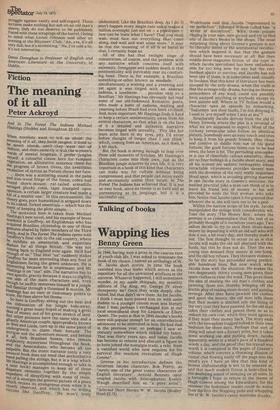Talking of books
Wapping lies
Benny Green
_ In 1944, having won a prize in the caucus race of youth club life, I was asked to nominate the book of my choice. I named an anthology of W. W. Jacobs short stories. In time the book vanished into that limbo which serves as the repository for all the unwanted artefacts in the universe. Whatever happened, I still sometimes wonder, to my suede shinpads, my monthly editions of The Ring, my George IV silver threepenny bit? Once they were deeply cherished, but that didn't save them. As for Jacobs, I think I must have passed him on with some disdain to a younger cousin even less literary than I was; perhaps I exchanged him at our local secondhand shop for Leacock or Ellery Queen. The point is that in 1944 Jacobs's books were still popular enough for an unintellectual adolescent to be interested in him. He had died in the previous year, so perhaps I saw an obituary somewhere which tickled my fancy. That was thirty years ago, and today Jacobs has become so remote and obscure a figure as to have joined the nostalgia trade, a relic from a vanished world who now requires for his survival the resolute revivalism of Hugh Greene*.
Greene in his introduction defines the recurrent Jacobs character, Bob Pretty, as "surely one of the great comic characters of English literature". Arnold Bennett once coupled Jacobs with Aristophanes; Evelyn Waugh described him as "a pure artist";
Wodehouse said that Jacobs "represented to me perfection"; Edmund Wilson called him "a writer of distinction". With these praises ringing in your ears, now go out and try to find any of Jacobs's books in the shops. The most surprising thing about Greene's gesture is not its chivalric intent or the sentimental recollection which inspired it, but that the gesture should have been necessary at all. But then middle-brow magazine fiction of the type in which Jacobs specialised has been unfashionable for too long now for any but the very hardiest spirits to survive, and Jacobs has not been one of them. It is sometimes said, usually by boobies, that this kind of literature has been usurped by the telly-drama, when the truth is that the average telly-drama, having no literary antecedents of any kind, could not possibly have usurped anything or anybody except its own asinine self. Where in TV fiction would a character open an episode by remarking, "Sailormen 'ave their faults, I'm not denying it. I used to 'ave myself when I was at sea"?
Structurally Jacobs derives from the old 0. Henry formula where the plot is a reversal of what we are supposed to expect. Most of the cockney vernacular tales follow an identical pattern. Somebody sees an easy touch and tries to keep it from his greedy friends; they cheat and connive to diddle him out of his good fortune; the good fortune turns out to be bad news; the biter is bit. The pervading atmosphere is one of cheerfully callous amorality; there are no finer feelings in a Jacobs short story, and all his women are sadistic termagants whose intractable viciousness provides decent men with the diversion of the only really important blood sport, which is avoiding getting married. In one Jacobs story in Greene's selection, the nastiest practical joke a man can think of is to .leave his friend lots of money in his will provided he weds the first woman who asks him. Notice that Jacobs takes it for granted that whoever she is, she will turn out to be a pest.
Within the narrow scope of his style, Jacobs manipulated the strings with considerable wit. Take the story 'The Money Box', where the premise is so commonplace that the rest of us probably thought of it ourselves years ago. Two sailors decide to try to save their shore-leave money by depositing it with an old salt who will dole it out, a bit every day, and thereby make it last. The first thought to occur to us is that Jacobs will make the old salt abscond with the funds, but this he does not do. Then the two young men demand their money in one lump, and the old boy refuses. They threaten violence. So far the story has proceeded along predictably humdrum lines. But now watch what Jacobs does with the situation. He makes the two desperately thirsty young men pawn their spare clothes to raise the wind. This gives them the idea of stealing the old man's clothes and pawning those too, thereby bringing off the double ploy of raising more money and gaining revenge. After they have pawned the clothes and spent the money, the old man tells them that their money is stitched into the lining of the very coat they have pawned. So the old man takes their clothes and pawns them so as to redeem his own coat, which they must agree to if they want their money back. The story ends with the two sailors trapped naked in their own bedroom for three days. Perhaps that sort of thing will never win a literary prize, but it takes some working out and putting down. Jacobs apparently wrote at a snail's pace of a hundred words a day, and the proof that his travail was worth it is contained in the pages of Greene's volume, which conveys a charming illusion of casual chat flowing easily off the page into the mind's eye. I have an idea that this kind of honest craftsmanship is not to be sneezed at, and that much modern fiction is bedevilled by the deafening sound of sneezing on all sides. In a fortnight I hope to return to the theme of Hugh Greene among the Edwardians; for the moment the hedonistic reader could do worse than dip into the Wapping pubs and whopping lies of W. W. Jacobs's canny maritime drunks.


































 Previous page
Previous page